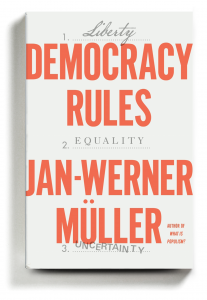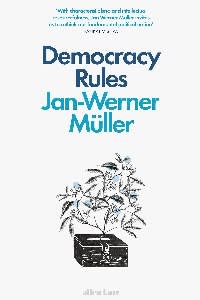 Does a new book’s insistence on a return to bedrock democratic principles “offer a road back from populist authoritarianism”?
Does a new book’s insistence on a return to bedrock democratic principles “offer a road back from populist authoritarianism”?
Optimism is about a constellation of probabilities; hope entails active effort, NYT’s Jennifer Szalai observes in a review of Democracy Rules by Princeton University’s Jan-Werner Müller:
Preserving uncertainty means that democracy is inherently dynamic and fluid. “Individuals remain at liberty to decide what matters to them most,” Müller writes, but holding onto democratic commitments also means that freedom has to be contained by what he identifies as two “hard borders.” People cannot undermine the political standing of their fellow citizens…. and people cannot refuse to be “constrained by what we can plausibly call facts.”
Müller argues that the genius of democracy is its constitutional principles, which offer a road back from populist authoritarianism, G. John Ikenberry notes in Foreign Affairs:
First and foremost is the nonnegotiable claim that the government cannot deny the standing of particular citizens as free and equal members of the polity. A newly elected leader cannot use the military to punish his rivals or use the tax system to destroy the opposition party. Losers accept their losses, with the understanding that they are limited and temporary.
 With fixed principles, however, comes fluid functioning, which brings in reasonable expectations. Democracy’s watchwords, Müller writes, are “liberty, equality, uncertainty”, adds Edmund Fawcett, the author of ‘Conservatism: The Fight for a Tradition’. Democracy brings disagreement, dissent and, at the limit, disobedience. It is complex and messy — too much for populists, who cannot cope with real democracy. They want an us-or-them argument, an unchanging, uniform “people’s will”, and winner-take-all solutions, he writes for the Financial Times:
With fixed principles, however, comes fluid functioning, which brings in reasonable expectations. Democracy’s watchwords, Müller writes, are “liberty, equality, uncertainty”, adds Edmund Fawcett, the author of ‘Conservatism: The Fight for a Tradition’. Democracy brings disagreement, dissent and, at the limit, disobedience. It is complex and messy — too much for populists, who cannot cope with real democracy. They want an us-or-them argument, an unchanging, uniform “people’s will”, and winner-take-all solutions, he writes for the Financial Times:
Müller sees the virtues of direct democracy but accepts that the representative kind, where voters send politicians in effect govern for them, is needed in complex societies with a high division of labour. Government in representative democracy must be open, responsive and callable to account, but not so intently or continually that it cannot function. In between government and citizen, accordingly, is needed “a critical infrastructure” of parties and media that criticises and mediates. How these vital organs are failing forms the core of the book.
How do we re-invigorate institutions essential for the success of democracy such as political parties and free media? How do we ensure the future dynamism and creativity of democracies? These are some of the urgent questions addressed in a CEU Democracy Institute discussion of Democracy Rules with the author and analysts Gráinne de Búrca, Jeffrey C. Isaac, Jan Kubik, Zsolt Enyedi and [contributor to the NED’s Journal of Democracy] Karolina Wigura.
Thursday, July 8, 2021, 8:00 pm – 9:00 pm. The discussion will be streamed live on the Review of Democracy’s Facebook page.
How do we re-invigorate institutions essential in a #democracy such as #politicalparties & #freemedia?
🗣️Jan-Werner Müller, Gráinne de Búrca, Jeffrey Isaac, @KubikJan, @KarolinaWigura & @enyedi_zsolt will answer such questions.
Join us & @revdem2020!
👉https://t.co/NmHwDEiteY pic.twitter.com/9tJHBBgbA0— CEU Democracy Institute (@CEUDemInst) July 1, 2021







